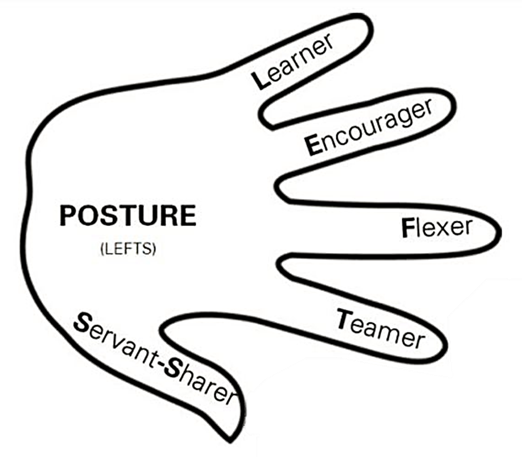
While you’re out in the community with part of your short-term missions team, an earthquake hits your Pacific Rim city. Where do you duck for safety when you feel the first tremor? What do you do after the shaking stops? If cell towers aren’t working, how do you connect with your teammates?
If you’ve been in a learner’s posture during your Stateside short-term orientation and in-country training, your response might save your life or someone else’s.
More likely, though, you’ve just landed overseas and you’ve been hit by the social equivalent of a 6.0-scale tremor before you even get over jet lag. The quaking you feel arises from fear or anger over your treatment by a host country citizen or even a team member. Your posture can help you deal with the situation and reduce the fallout.
Navigators often share an illustration called the Word Hand. But another hand illustration, the Posture Hand, prepares you to adopt attitudes that set up you and your team for success on your short-term mission trip. The Navigators short-term orientation program and others with intercultural posture lessons can assist you in thinking through your attitudes well before you step foot on an airplane.
You’ve probably heard, “Sit up straight.” For spiritual growth and formation, the Posture Hand* enables you to build your core approach to missions. This simple illustration contains five digits (spelling LEFTS) and the potential to help you hold your expectations and attitudes before God with an open hand.
Learner: Understand before being understood
“We’re here—let’s get going!”
You’ve invested time and effort into your preparation for your short-term trip overseas. If you’re like many short-term missions workers, your friends and family have invested as well, with their prayers and finances. You want to see God do great things during your short time in the country, so you need to get started right away. You want to get busy so you don’t waste an hour.
Taking the posture of a learner will help you take a breath and ask God to use your powers of observation and the insights of others to first learn a bit about your host country and its people. Everything from food to sharing Christ to bathrooms may look different overseas. The team that listens best may learn the most.
Learners work to understand before being understood. You’ll likely communicate the Good News more easily and appropriately in this unfamiliar culture if you start by asking questions—lots of questions—especially of your local hosts.
Try to open yourself up to new ideas and approaches, even within your team. At a recent Navigator short-term orientation in the Midwest, an aspiring team leader saw the Posture Hand illustration and immediately wanted to adopt it: “This is not just for missions,” he said. “This is for life!”
Encourager: Building others up
Your presence on the mission field can encourage your teammates, your team leader, even your receiving hosts if you posture yourself toward “building others up” rather than tearing them down (Ephesians 4:29).
Your team will encounter many new situations and obstacles in your host culture. You may often feel tired and overwhelmed. An encourager will step in with a word or kindness that brings teammates together. When encouragers influence teams, the team leaders thank God, because your love for each other will communicate across cultures (John 13:35).
Acting as an encourager works not just for your team but also for your receivers, including expatriates serving in their adopted country. The organization Standards of Excellence in Short-Term Mission says, “An excellent short-term mission establishes healthy, interdependent, ongoing relationships between sending and receiving partners.”
A team on a Navigator trip to Eastern Europe acted as encouragers at the specific request of the long-time missionary there. The team had joined in alongside the missionary in the local ministry, busily carrying out their duties from morning through evening daily. Then one evening the missionary asked the team to meet with her for dinner, just her and the team. The missionary, who rarely got time with a group of Navigators, let alone fellow Americans, just wanted some time to share about life and ministry. The team buoyed her spirits simply by making themselves available.
Flexer: Semi-organized chaos
Your host culture will offer plenty of opportunities to learn flexibility. From those leaning toward “having everything just so” to others constantly looking for new experiences, adopting the attitude of a flexer will make the oddities on your trip less jarring and more fun. You and your team can all embrace the adventure of flexing as you learn your new culture.
- Your team may all be standing on a train platform trying to decipher the symbols and language to get to your meeting across town.
- You may set up a group appointment for a definite (to you) time and wait for hours for your local friend to arrive because of his relational commitment to his friend who arrived just before he walked out the door.
- Your hosts’ dinner table may hold delicacies that you’d rather leave uneaten. You may wonder how your digestive system will react to this weird stuff. (OK, as cross-culturally sensitive people we’re not supposed to say, “That’s weird.” Instead, we should say, “Eating insects is just different. And protein-packed.”)
Flex and embrace the weirdness, the differences.
Even before you leave, good short-term orientations can present you with games and role-playing scenarios described as “semi-organized chaos,” to prepare you for your real-life experience on the mission field. People who jump in with both feet often learn great lessons about flexing that can prepare them for enjoying their time overseas.
When living in another culture temporarily overwhelms you, you’ll want to complain about your accommodations, local practices that don’t seem right, your local hosts, your team leader, and even your fellow teammates. If you “do everything without grumbling,” Paul wrote to the Philippians, you can “shine like stars” wherever you are (Philippians 2:14-16).
Teamer: Live and love in community
You’re going to live and minister closely with your team for a long time. Being overseas, especially if you’re housed together, will bring out your idiosyncrasies. Don’t like a wet tile bathroom floor? Do you object when you see toothpaste squeezed from the middle of the tube? Do you tend to think that, while people use many methods of leading outreach or Bible studies, your practices are best? A teamer takes the posture of loving others well, even when conflicts arise within the team.
If you’re going to live in community and “love one another” (John 13:34), you may need to withhold judgment and remain open to differences. (Remembering the learner, encourager, and flexer postures can come in handy with teammates as well as with the local culture.)
Extraverts can thrive in missions team environments because of their natural tendency loving time with others. Spirit-led extraverts can contribute to teams with their gifts of oiling the machinery of the team. If your tendency toward extraversion, however, often leads to saying whatever you think whenever you feel it, you may find that the local culture requires you to rein in your opinions. After a full day of keeping things internal, what you perceive as rude behavior back in your team’s room may tempt you to spout off at a teammate. That might prove to be a good time for writing in your journal, processing with God instead. You may find a better time to work through things in your people-centered way.
Introverts, on the other hand, may bring the gift of question-asking and listening to their team. These people might learn cultural cues quickly if they listen well and soak in lessons. But being a teamer may prove especially hard for introverts. You may want to retreat into your device or at least into a separate room when relationships prove difficult, as they often do. When things get hard, you may be tempted to shut yourself off from your teammates, especially if the trip ends in a week. People who lean into relationships, however, find that they benefit from working things through. Even people who would rather avoid conflict and internalize feelings find that they can make true long-term friendships with teammates when they talk through differences.
Servant-Sharer: Creating space for the Good News
A servant-sharer shares the gospel while living life, serving and loving others. This posture can open doors and hearts to what God wants to share through you.
One missionary in Hungary hosted a summer missions team that served at a local camp. Local non-believing students worked alongside the team with local campers. “Serving together,” explains the resident missionary, “creates space for living and speaking” the gospel. One young local woman who came to know Christ during the summer began reading the Bible and growing in her faith even after the summer missions team had returned home. Service and sharing opened a new door for faith, one that opens disciplemaking opportunities for resident missionaries.
When you spend time in another culture, serving and appreciating new friends, you’ll want to share your life and faith with them. Paul said as much after his short-term ministry with the Thessalonians (Acts 17:1-4). He wrote back to them, saying “we were delighted to share with you not only the gospel of God but our lives as well” (1 Thessalonians 2:8).
Why did you want to spend time in a different culture on a mission trip? Jesus came, He said, not “to be served, but to serve, and to give his life” (Mark 10:45). A servant-sharer imitates Jesus not by holding onto a normal life but by stepping into opportunities to minister to others, including those don’t yet know Christ and may not be able to thank you later.
Practicing good posture
Even with a mission trip that’s been planned with care, aided by funding partners, saturated with prayer, and led by experienced people, circumstances can disorient teams. Relational tremors, even small ones, can turn a life-giving trip into a difficult exercise.
Managing expectations and attitudes through LEFTS postures, on the other hand, can keep a team serving steadily and growing in their effectiveness as a short-term benefit to the host receivers.
The postures that you practice as you serve overseas can positively affect the spiritual landscape of your host country well beyond your stay. Maintaining these good postures on your short-term trip can help your team, like Paul’s in Thessalonica, make a difference for eternity as you share “not only the gospel of God” but your lives as well.
* Source unknown.
